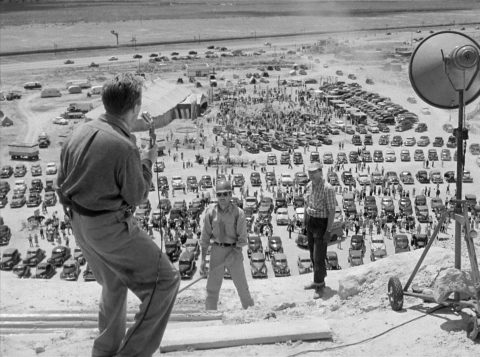
Double Indemnity (1944)
Of the several James M. Cain novels made into noir films (The Postman Always Rings Twice, Double Indemnity, Mildred Pierce - in order written) Double Indemnity exploded into the movie going consciousness, which both solidified and set the standard in the nascent film noir movement with its use of narrator, femme fatale, chirascuro lighting and set design, and moody tension.
It was directed by the incomparable Billy Wilder, its screenplay by by himself and Raymond Chandler, and was memorably photographed by Joh Seitz The perfect casting starred Fred MacMurray as Walter Neff, Barbara Stanwyck as Phyllis Dietrichson, and Edward G. Robinson as Barton Keyes.
Wilder stepped into what would become a famous mainline style purely from the desire for artistic exposition, and to make a good film. His famous quote: “I never heard that expression film noir when I made Double Indemnity ... I just made pictures I would have liked to see. When I was lucky, it coincided with the taste of the audience. With Double Indemnity, I was lucky.”
Most fans know the story: an insurance salesman mentored by a tough, moralistic, wily claims examiner falls for an enticing woman who later enlists him for a murder plot of her husband in order to collect the life insurance benefit from the company who employs both the salesman and the mentor. “Double Indemnity” refers to a clause is some life insurance policy that results in double payment as the result of an accidental death. Many characterize the story as one of a scheming femme fatale who uses her lover’s emotions against him in order to bring off the crime. And that’s true in part. But the real story is how the salesman tries to outwit his long time mentor, and to pull off the crime while fooling his hero. It’s as much a cat & mouse game as it is a doomed love story-- two men bound together in an intrigue, with only one of them knowing the truth until the end. Curiously the audience is inclined to sympathize with Neff, which is interesting given the matrix of mid-’40s morality.
MacMurray and Stanwyck had worked together 4 years earlier in Remember the Night, a romantic comedy. And now each was the highest paid actor in Hollywood of their respective sexes. Stanwyck didn’t want the role, and had to be coaxed into it, whereas MacMurray --being a light comedy actor-- didn’t believe he could handle the part. He too had to be convinced. Their pairing for DI turned out to be one of the best in film history. And Robinson also wowed audiences with his portrayal. One of his best known scenes was the “method of suicide” monologue, which is one of the most memorable from the era.
Wilder’s direction was masterful, as he reportedly was trying to out-do Alfred Hitchcock in excellence. But it was the pregnant and rough clipped dialogue --chiefly written by the great Raymond Chandler-- that set the mood up on a pedestal, never to be knocked down. Chandler’s hard boiled word interplay was to be a master class in dialogue for future film noir writers. Wilder rewarded Chandler with a cameo, visible 16 minutes into the film, looking up as he sat outside the door of the insurance office reading a newspaper as Neff passed by. That cameo remains as the single instance of Chandler visible on film.
Cinematographer John Seitz brought with him years of experience from a catalogue of fine films to photograph the shadows and set design necessary to this picture. He was to follow it up with other top Wilder films such as The Lost Weekend and Sunset Boulevard. Also at a high level was Miklos Rozsa’s alluring score. He typically set moods by use of leitmotif musical passages representing the main characters, and also for surreptitious meetings between the two principals.
James M. Cain had written the novel on which the film was based, and many of the studios wanted the rights. But when Paramount finally acquired the rights the Hays office objected that the film was too tawdry, and that MacMurray’s character (Walter Neff) hadn’t received a decisive enough demise. Wilder had initially written and filmed an ending at great expense that showed Neff being executed in the gas chamber while his mentor looked on. But yet that ending was thought to be too gruesome by the censors. On reconsideration Wilder realized that the way Neff’s end was shown in the final cut was perfectly proper, given the nature of the two characters’ relationship, so he omitted the gas chamber ending entirely, and we all can be grateful for Wilder’s decision.
DI is one picture on a small list of films which would be difficult to imagine anything added or subtracted. It’s one of those happy convergences that have occurred over the decades that bring just the right people together at just the right time. Double Indemnity is not only arguably the finest example of film noir, but is on its own one of the great films.

 Check out my podcast:
Check out my podcast: 
